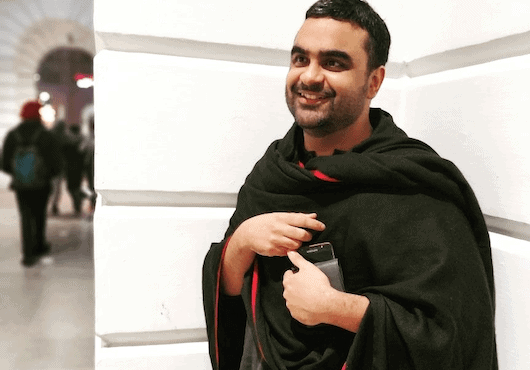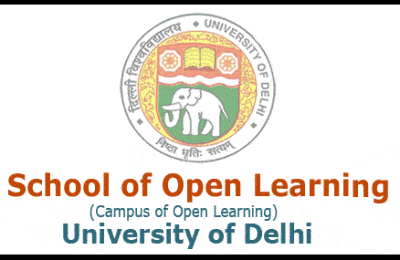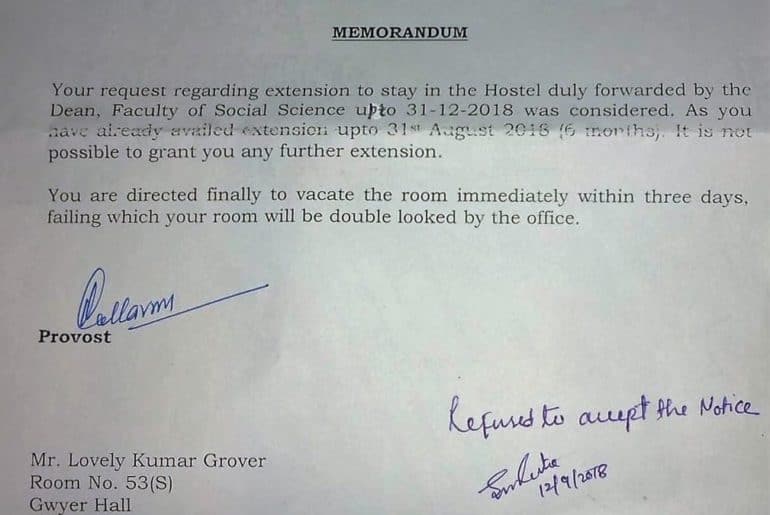DU Beat brings to you a conversation with Rahul Dua, the runner-up of Comicstaan.
The scene was set. After much effort, when the lights were fixed and the noise was reduced near the interview table, a call informed us that Rahul Dua’s (the runnerup of Comicstaan, on Amazon Prime) car had broken down on his way to the venue. Cut to 20 minutes later, he is at the venue despite how the day was treating him, and is whistling his worries away! It took just a moment for him to make us feel like we have known him for years. He began telling us his typically personalised stories in the same witty spirit and we made sure to begin right from the basics!
Q) Since you have done your MBA from the Faculty of Management Studies, what do you love and hate the most about DU?
FMS never seemed like a part of DU. The MBA syllabus is very rigorous. You all would get free at five in the afternoon and could chill. However, we used to stay in college till midnight, as our seniors used to teach us how to prepare ourselves for summer internships and placements. No one considered us a part of DU, man!
Vishwavidyalaya pe bolte the FMS jana hai, par unhe pata hi nahi hota tha. Hamari pehechan thi Kirori Mal ke saamne wala college. (We used to ask the rickshaw drivers to take us to FMS from the Vishwavidhlaya metro station but they didn’t know our college. Our identity was ‘the college in front of KMC’.)
I had come to DU from Thapar University which is a gated campus. It didn’t matter what was happening on the outside world because inside the gates, we were protected. But DU mai aisi feel hi nahi aayi (It doesn’t feel that way in DU). This is something I never liked. A residential programme is very important. The connect between hostelers can not be found between day scholars. My fellow hostelers and I know everything about each other. But, the good thing about DU is that the fees is very less so there’s less burden on parents.
Q) Any DU fads you remember?
When we came to FMS, we got to know that the kebab sold in DSE’s canteen are supposed to be very tasty. Now DSE is right behind our campus. Lamba kaun ghoom ke jaye? Dewaar fandi and ghus gaye DSE mai. (Who would take the long route now? We just used to jump over the walls.) We had the kebab. No offense meant, they weren’t so special. But St Stephens’ cheese omlette. Oof! It’s amazing! I like their campus too! But we never got the entry. So we shaved our beards and wore tight t-shirts to look younger, to get the entry. However, I did that just a few times as it seemed like too much effort to shave.
Q) Out of all the people you’ve met and things you’ve done in college, has any of it played a huge role in getting you where you are today?
Of course, everyone has their little roles to play in what I am today. Mahesh Shetye was from FMS, in the same batch as me. We weren’t that close in college. However, in Mumbai, we got a flat together. He literally pushed me into stand up. There is something called as an MBTI test that was taught to us in FMS. Mujhe ghanta nahi yaad hai (I don’t remember it one bit) but he knew it. He, in his room gave my MBTI test which is a personality test. He answered everything he knew about me on his own. If he didn’t know anything he would come to me and go like,“Acha, Dua, what’s your favourite colour?” I was like, what is he smoking, man? I need to know! He came to my room one night at 2 p.m. , wearing his typical loose t-shirt and shorts. “So, Dua, I have given your personality test,” he said. Wait, he had given my personality test? This entire thing did not make any sense. “It tells me that you are made for the entertainment industry. This bankvank is not for you,” he said. I dismissed him saying we have to go to office the next day and have no time for this. He sat uninvited on my bed and said I should try stand up. So he had a very important role to play. And I am so guilty that I couldn’t call or meet him in these 1.5 years. Other friends of mine like Angad, Saurab Malhotra, Chitra, and Anna also supported me immensely.
Q) When and why did you think of switching to comedy?
I was working in a bank. They had drained me. On paper, it was five days a week. I used to work seven days a week. I had no time for friends or even for the gym. I needed to vent out. I was the funniest in the group. Some colleagues told me that I should try open mics. Back then, I had told them the story of Batra ji and the bees, and also that I performed in Comicstaan’s second episode and they had lost their shit. That was the story that I tried in my first open mic as well. Then, there was no looking back. I felt so empowered and unrestricted on the stage and thought I must do it. I didn’t think of taking it up as a profession but did it only because it was fun. After interacting with a lot of people, I got to know it’s a full-time career option also. From then onwards, everything gradually started falling in place to make this happen.
Q) What do you hate the most and love the most about Comicstaan?
I love that it has changed my work ethics. We used to write at our own leisure and pace. We used to write a 4-minute set in 2-3 months but on the show, we did it in 6 days! I learnt from the masters of the game! One thing I hated about Comicstaan was that they never aired everything they captured behind the scenes including a 30-minute long interviews they took of us. We wasted a lot of time there. My alternative comedy and finale set was edited out. I gave them my content, but I have worked on it for one and half years. A lot of my jokes did not make the cut because of time constraints. Though, I am not complaining, I got much more than I expected.
Q) You subtly joke a lot about being the second on Comicstaan. Is it to hide some insecurity or just because it always gets a laugh?
For the first few days I kept thinking why I couldn’t be the first but now it doesn’t matter. I know for a fact that I am pretty decent. But I am not right up there so I have to improve myself.I am good friends with Suri,(Nishant Suri, the winner of the show) and he feels the same way. We aren’t the best and the ones who didn’t make it to the top top are not bad as well. It’s only about being that good on that day. There is no insecurity. Obviously six lakh milte toh bahut acha lagta but aa jayenge paise. Baad mai aa jayenge. (If I would have won the prize money, I would feel awesome! But the money will come later, its fine!)
Q) How do you tackle always being happy and making others happy as well?
Thoda pressure kum hua hai aaj kal. Kyuki first thodi aaye hain. (This really is a little pressure! It has been reduced lately as I am not the winner, anyway!) When you see a comedian on stage, he is very different from what he is off stage. If you expect him to be funny all the time, you have wrong expectations. Everything on stage is built over time and rehearsed. I am generally a happy-go-lucky person. I might be funny in bits and pieces but it is difficult for me to be funny all the time. And if you come out to me and say “Hey, comedian, tell us a joke, no?” I’d say, no, you pay me, first!
Q) What do you have to say to the budding comedians?
See, I know it’s scary. But try it once! Bada maza aayega. (It will be fun!). But it’s better to get up on stage with zero expectations and get two laughs than expect 10 laughs and get two. Phir nass kaat loge! (Then you’ll cut your veins!) No point. And keep hitting at it. Keep seeing what other people are doing and learn from it. That’s the crux of the art form. You can’t do it sitting at home. It may be funny on the paper but the audience may not laugh at it. You will have to go up on the stage. It’s really empowering and fun.
Q) Would you do shows in any DU colleges?
Why not! Bula toh lo? (Just call me, already?) I have some material on all topics, you want me to perform on relationships, classes, anything, I have it! Give me money, I will come.
Image Credits: Adithya Khanna for DU Beat
Khyati Sanger
[email protected]










